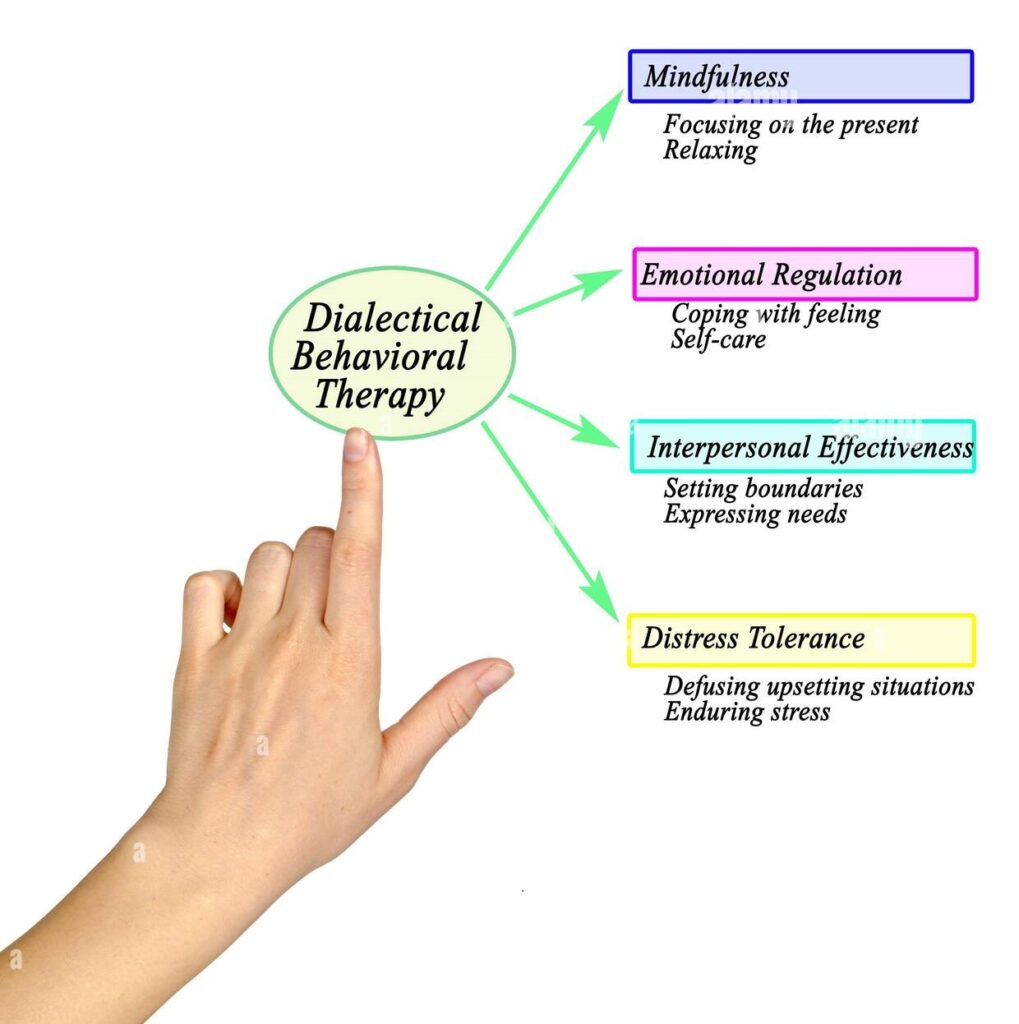DIALECTICAL BEHAVIOR THERAPY

What is Dialectical Behavior Therapy (DBT)?
Dialectical behavior therapy (DBT) is a type of talking therapy. It is based on Cognitive behavioral therapy (CBT), but it is specially adapted for people who feel emotions very intensely. The term ‘dialectical’ comes from the idea that bringing two opposites (acceptance and change) together in the therapy can bring better results than either one alone.
How long is the duration of therapy?
There is not a set duration for Dialectical behavior therapy (DBT). The length of your treatment can vary significantly depending on your goals, severity of your diagnosis, and whether or not you are part of an informed DBT program or a comprehensive program. A full course of DBT may take around 6 months to 1 year to complete.
Individual therapy usually involves weekly one-to-one sessions with a DBT therapist. Each sessions last approximately 45-60 minutes.
- How does DBT help?
DBT is an evidence-based approach which helps patients find ways to accept themselves, feel safe, and manage their emotions to help regulate potentially destructive or harmful behaviors. Some of the strategies and techniques that are used in DBT include the following:
🔵 Core Mindfulness– Mindfulness helps you focus on the present or ‘live in the moment’’. It also helps you slow down and focus on using healthy coping skills when you are in the midst of emotional pain.
🔵 Distress Tolerance– Distress tolerance skills help you accept yourself and your current situation. It teaches several techniques for handling crisis such as distraction, self-soothing, improving the moment, etc.
🔵 Interpersonal Effectiveness– It helps you to become more assertive in a relationship while still keeping a relationship positive and healthy. It also helps you to learn to listen and communicate more effectively.
🔵 Emotion Regulation– It helps you navigate powerful feelings in a more effective way. The skills you learn will help you to identify, name, and change your emotions.
- What can I expect from DBT?
DBT can vary between different providers and across different areas. But the types of sessions that a DBT course usually includes:
- DBT pre-treatment (This is where the therapist will look at how suitable DBT is for you. They might offer you several sessions where you will learn about DBT model and then decide if it the right therapy for you)
- Individual therapy (This usually involves weekly one-to-one session with a DBT therapist. Your therapist is likely to ask you fill out diary cards as homework and bring them to sessions. This is for you to track your emotions and actions. You use this information to decide together what you will work on in each session)
- Skills training in groups (In these sessions DBT therapist teaches you skills in group setting. There are usually two therapists in a group and sessions might be weekly. The aim of these sessions is to teach you skills such as mindfulness, distress tolerance, interpersonal effectiveness and emotion regulation that you will apply to your day-to-day life)
- Telephone crisis coaching (This means that you can call your therapist for support between sessions. For example: When you need help to deal with an immediate crisis such as feeling suicidal or wanting to harm, or when you are trying to use DBT skills but need some advice on how to implement them, etc. But you can expect your therapist to set some clear boundaries around this such as calls should only take place between hours you agree with them or calls are usually brief, etc.)
- Which mental health issues does DBT help with?
DBT was initially developed in the late 1980s to treat people with borderline personality disorder (BPD) and chronically suicidal individuals. But it has been adapted for other mental health problems that threaten a person’s safety, relationships, work and emotional well-being. Other mental disorders where DBT might be used as an effective treatment are:
🔵 Eating disorders (such as anorexia nervosa, binge eating disorder and bulimia nervosa)
🔵 Post-traumatic stress disorder (PTSD)
🔵 Substance use disorder
🔵 Non-suicidal self-injury
🔵 Obsessive-compulsive disorder (OCD)
- How is DBT different from other talking therapies like CBT?
DBT | CBT |
DBT focuses on balance and the relationship between acceptance and change. | CBT focuses on thought patterns and their redirection. |
DBT usually involves sessions over a more extended period of time where the therapist and client can consider the larger picture. | CBT is usually completed after a short interval. These sessions focus on specific problems. |
DBT is can be used in different settings such as one-on-one and group settings. | CBT nearly always takes place in one-on-one setting. |
- Getting the most out of DBT
- Take notes. Taking notes is a great way to capture information that you think may be helpful for you to reflect on later.
- Maintain an open, eager and willing attitude. It’s important to be open to the process. It takes willingness to feel emotions that are difficult or confront situations or experiences that are painful.
- Do your DBT homework. When your therapist assigns you to complete your diary cards at home, make sure you complete it and bring back to the class.
- Be your own cheerleader. Support and encourage yourself to keep pushing through. Remind yourself that you have made a commitment to improve.
- References
https://www.rcpsych.ac.uk/
https://www.rcpsych.ac.uk/
https://www.verywellmind.com/dialectical-behavior-therapy-1067402
If you are experiencing similar
problems please contact us
+971 52 861 7053
Call / WhatsApp Us
